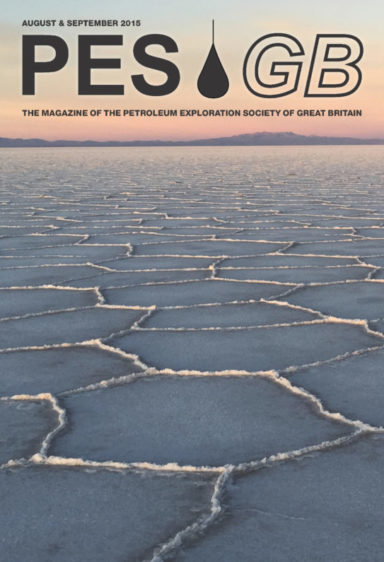PESGB August & September 2015
- Back to Basics, Hamish Wilson, PESGB President
- Optimising Understanding from UKCS Relinquishment Reports
- Sanctions Squeeze Siberian Supply
Plus much more inside
Back to Basics…
PESGB President Hamish Wilson reflects on the current state of exploration, and what we can do about it in the current economic environment
 The industry has been in its summer recess with the usual quiet couple of months in July and August, as first Scotland and then England, went on holiday.
The industry has been in its summer recess with the usual quiet couple of months in July and August, as first Scotland and then England, went on holiday.
It is therefore perhaps a good time to reflect on where we are with Exploration. The oil price has not moved and remains depressed, with little sign of recovery through to 2016. Perhaps it is time to recognise that this price regime is the new reality and we should make our plans on this basis. So what should we do about exploration in this low price environment?
Exploration continues to under-perform. In Norway my colleagues at REP report that for wells in which Statoil are not involved, there have been 17 back-to-back dry wells, all of which have been 78% state funded. Other well known oil companies have long sequences of dry holes. Irrespective of the price environment, this sort of performance is unacceptable both to investors and to the countries in which dry holes are being drilled.
From the UKCS standpoint the lessons are clear:
1) The route to success is through basin mastery – i.e. fully understanding the petroleum system through systematic play based analysis. Outside the leading operator, Statoil in Norway, we don’t have a thorough understanding of the geology.
2) We are drilling too many wells. We should be focusing on drilling fewer, better wells.
3) State funding of exploration through Norwegian style tax incentives would be a waste of money.
More broadly for exploration, the strong sense I get is that we should be returning to the basics and investing in high quality geoscience. The geophysical industry is delivering some excellent sub-surface images but the interpretations are let down by lack of regional context.
Geoscience interpretation takes an investment in people, time, and data, which makes the current phase of cuts in staff, training and data even more disturbing. Exploration regeneration will take a concerted long-term effort in rigorous systematic basin analysis, a process that obviously requires trained staff and data, both of which are the elements known to underpin successful exploration.
The one piece of good news to emerge over the summer is the government’s decision to short cut the shale gas planning process if there has been undue delay. This should help the industry to get going and test the plays. While the public outcry at this decision is entirely predictable I remain concerned at the perception that support for shale gas means a withdrawal of support from renewables. They are totally independent. The confusion and mixing up of renewable and shale gas agendas is perhaps our fault – we have traditionally been poor at explaining what we do to those outside our industry.
To this end, I’m very pleased at the progress that Guy is making in starting a project to assemble a pack of material that members can use to improve this perception. This is in addition to the exploration game promotion work being led by Marc Bond. An event will be hosted at the PESGB offices on 23 September to train those who are interested in becoming facilitators for this game (see page 7 for further information).
September is a big month for the PESGB with the Africa Conference at the beginning and the Petroleum Geology of North West Europe at the end of the month. I do urge you go come along and learn! I hope to see many of you at both conferences.


